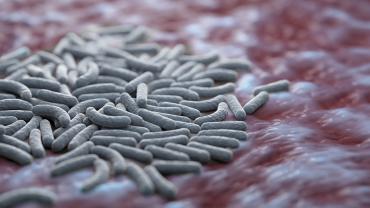
The microbiome plays an important role in gut health and overall wellness. Many different species and strains of bacteria work synergistically to impart benefits, including supporting immune function, producing short-chain fatty acids (SCFAs), synthesizing neurotransmitters and vitamins, and producing other important metabolites. Dysbiosis, or an imbalance of commensal and pathogenic bacteria, is associated with an increase in inflammation. Studies have also identified a link between dysbiosis and many chronic diseases and gastrointestinal (GI) disorders.
Lactobacilli, including those in the acidophilus species, are not only important members of the native gut microbiome, but they are also frequently used in probiotic supplements. One particular strain, Lactobacillus acidophilus DDS®-1, has recent clinical trials supporting its potential efficacy in supporting gut health. It is a human-origin strain with a good survival rate and adherence to the intestinal epithelium when used as a supplement.
A probiotic supplement has the potential to improve the gut microbiome and positively affect GI and immune function. In mice studies, DDS®-1 has been found to increase Firmicutes abundance (associated with an increase in beneficial bacterial species, in general) and enrich Akkermansia (species that produce butyrate) and Lactobacillus populations. It also improved the microbial metabolism of amino acids, proteins, and carbohydrates, and associated beneficial metabolites. DDS®-1 also increases butyrate production and supports the immune system through downregulating inflammatory cytokines.
Human studies confirm this beneficial change to the microbiome. One study on patients with functional constipation found that a probiotic supplement with a blend of DDS®-1, B. lactis UABla-12, B. longum UAB1-14, and B. bifidum UABb-10 for 4 weeks improved bowel function and also shifted the microbial profile. Compared to baseline, the probiotic group had a higher relative abundance of Ruminococcaceae (the second most abundant Firmicutes family that help generate SCFAs and are beneficial to gut health and function) and a lower relative abundance of Erysipelotrichaceae (bacteria associated with inflammation-related GI disorders and metabolic disorders).
In addition to improving the makeup of the microbiome, DDS®-1 supplementation has been shown to benefit gut function. In one randomized controlled trial, patients with irritable bowel syndrome were divided into three groups: a placebo group, an L. acidophilus DDS®-1 group, and a Bifidobacterium animalis lactis UABla-12 group. After the 6-week trial, both probiotic groups experienced an improvement in symptoms, including abdominal pain, distension, bowel habits, stool consistency, and quality of life, with a slightly better response in the DDS®-1 group. Another clinical trial found that the DDS®-1 strain significantly improved abdominal symptoms, such as diarrhea, cramping, and vomiting in patients with lactose intolerance compared to a placebo.
Many potentially beneficial strains of bacteria support a balanced microbiome and gut health. Consuming a diet rich in fiber, fermented foods, and other gut-healthy foods provides a foundation on which to build a healthy, diverse gut microbiome. A probiotic with researched strains, such as L. acidophilus DDS®-1, may also provide additional aid for those requiring more support for gut health.
By Kendra Whitmire, MS, CNS